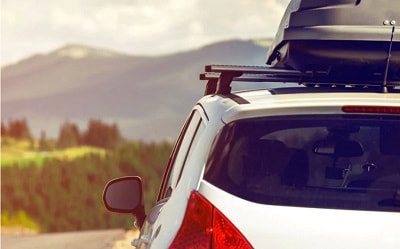How to Book Cheap Car Hire in New Zealand (and Overseas)
Daily car rental costs are cheap, but insurance excess cover can easily double or even triple the overall cost - our guide looks at everything you need to know to get the best rental car deal
Updated 4 December 2020
Car rental us usually problem-free in New Zealand - many price comparison websites publish attractive offers. It's not unusual to find one-week rentals of Toyota Corolla-type cars for as little as $150 to $300 (or $25 - $50 a day). However, the costs usually don't there. There's a lot of confusion around the high additional costs for paying to eliminate the car rental excess, also known as 'Excess Reduction (ER)' and 'Zero Excess'. This is the cost of lowering the excesses for damage from eye-watering $3,000 or $5,000 down to zero or around $500. For example:
Our guide to rental cars
This guide covers useful tips to use when searching for a car rental deal, and what to do to protect yourself to ensure you don't get an unexpected charge. Out guide outlines:
- Budget charges around $298 for a week of 'Zero Excess' of their standard-size cars. This is an annualised cost of $15,530.75, which, objectively, seems high for a zero excess car insurance policy. But others charge more:
- Hertz and Thrifty both charge $46/day for zero excess insurance for a small and medium-sized car. That's an annualised policy cost of $16,750.
- To make sense of these, we explore excess insurance costs in detail below.
Our guide to rental cars
This guide covers useful tips to use when searching for a car rental deal, and what to do to protect yourself to ensure you don't get an unexpected charge. Out guide outlines:
Car Rental - Our View:
- Car rental is, for the most part, inexpensive in most New Zealand cities. You should be able to arrange a hire of a small to medium-sized car for $25 to $50 a day from the likes of Budget, Apex and Go Rentals, among others.
- However, the quotes you see exclude car excess reduction. If you want to reduce your risk of handing over thousands of dollars, you'll need to pay an additional per-day fee. This ranges from around $18 to $46 per day and is a cost that quickly adds up. You may have an insurance policy but if you do have an incident with your vehicle, you'll still have to pay the costs upfront and claim them back later on. This can prove to be an expensive hit on your credit card with standard excesses ranging from $2,500 to $5,000 being charged upfront.
- Rental car companies may charge a surcharge if you pay by debit or credit card. Hertz, for example, subjects customers to a 2.53% (inc GST) credit card processing fee on the total amount due. Avis and Budget both charge a fee of 2.53% for MasterCard and Visa and 3.57% for American Express (incl GST). As debit and credit card is the most common form of payment, this is a hidden cost that you need to be aware of.
Renting a Car - 10 Must-Know Tips to Save and Get the Best Deal
Finding the right car rental can take a bit of legwork - our tips below guide you through each step of the rental process, right up to dropping it off on the last day.
Find the best prices by entering your dates into comparison websites (it's faster and offers completeness)There’s no point going to each car hire company’s website individually and entering in the dates – specialist car hire comparison websites let you know what the prices are in seconds.
While those listed may not compare all car hire companies, they tend to cover the big ones – Hertz, Avis, Budget, Thrifty, Europcar and a number of second-tier brands.
|
Understand what’s important when you go to bookCar hire companies have generally improved their services over the years as more and more reviews are posted online from their customers. Before making a booking, it's useful to confirm:
|
Book early and look for ‘book-direct’ discountsGenerally, booking early works out to be cheaper, but not always. COVID-19 has changed the car hire industry with many high-profile companies such as JUCY going into receivership. We suggest using a comparison website and, once you shortlist two or three car hire companies, check their website to see if they offer a discount or coupon for booking direct.
MoneyHub founder Christopher Walsh shares his experience: "My process is simple - I use a comparison tool, and then, having shortlisted two or so companies, I visit their website directly to see if further discounts are offered by booking directly. I recently booked a 'pay for three days, get one free' deal which Budget was running at the time. Before that, I have used promo codes and coupons to save money when booking Queenstown-based Hitch Rentals directly. There's a lot out there - and rental car companies like it most when you book direct with them". |
Be careful about buying a third-party car excess policies from a travel insurance policy - you'll still have to cover any costs upfront, and then chase up paperwork to make a claim‘Basic’ insurance is always included in a car hire, but the excess will usually be thousands of dollars ($2,500 to $4,000 is the norm in New Zealand). A few insurance companies such as Southern Cross, 1Cover and CoverMore offer domestic travel insurance, which covers car hire excess and repairs. However, with the exception of Southern Cross (which offers a $0 excess option), 1Cover has a $100 excess, and CoverMore's is $25. You’ll also need to pay the costs upfront and claim them back later, which can be inconvenient. While policies for seven days ranged from $50 to $60, any charges arising from a car rental agreement will need to be covered by the renter upfront and claimed once all repairs are finalised etc.
MoneyHub founder Christopher Walsh shares his experience: "We don't know now popular domestic travel is, and how good value it is overall (the Consumers Institute is sceptical per this Stuff.co.nz article), but there are alternatives. We’ve heard from a number of American Express cardholders who have car excess insurance as a benefit of their Platinum card. Amex is, arguably, better than a third-party car excess/travel insurance policy because they handle the claim via the card, meaning you don’t need to source paperwork to make a claim. The only limit is that you can claim up to twice a year – if you’re an unlucky driver and use up this allowance, it’s best to consider buying out the excess with the car hire company directly as it will most likely be cheaper". Know this: If you have third-party excess coverage, you’ll need to cover any costs on your credit card.
|
Avoid the ‘extra’ costs by arriving preparedAdditional items are pure profit for car hire companies – bring your own and save. Examples of items include:
|
Challenge whether you need car hire in the first placeFor a road trip, it’s almost certain to be essential. However, for a city trip, it may be cheaper and more convenient to use rideshare, public transport or take your own car. Sometimes car hire can be more hassle than it’s worth, especially if you’re visiting one location for a short time.
MoneyHub founder Christopher Walsh shares his experience: "After two $4,000 credit card charges hitting my card for a bumper dent from a well-known car rental agency, I decided to cancel an upcoming hire for a Tauranga to Napier 'East Coast' road trip. I also cancelled my flights and picked up the rest of the travelling party in Tauranga who were flying in. Instead, I drove my car from Auckland and back from Napier. By doing this, I saved over $1,300 in car hire costs, utilised my existing standard comprehensive car insurance, saved on airfares and knew up front how much luggage I could fit in the boot before setting off. I’m happy with this decision, even though it involved nine extra hours of driving (Auckland to Tauranga, and Napier to Auckland)". |
Understand the different vehicle categoriesEach car hire company has a unique fleet and categorisation, but one rule generally applies to all – the smaller the car, the cheaper the hire cost. The exception being sports cars and roadsters.
You may be asked if you want to upgrade the vehicle when you collect it – this is a standard upsell and it’s difficult to compare what you’re getting on the spot. In general, we believe that unless the deal offered is $10 a day extra or less, it’s seldom worth upgrading to a next-category car. |
Additional drivers can be added at the time of booking or when you collect it - prices do vary between car hire companiesBudget, for example, charges NZD $5 (excluding GST) per driver per day, capped at 5 days and a maximum charge NZD $25 (excluding GST). Apex, on the other hand, doesn’t charge any fee for additional drivers. If this is a consideration, it pays to check the terms and conditions regarding additional drivers.
|
Collecting your car – our must-know stepsCar hire companies take different approaches to how you pre-inspect a car. Some will assure you the car is in perfect condition and get you to sign without seeing it; others will give you a piece of paper with a car outline so you can mark any scratches or dents. Whatever you do, make sure you note any damage BEFORE leaving the collection location. To do this, we suggest:
Help on the road: When you collect the car, make sure you ask what the emergency breakdown or accident number is should a problem arise later on. |
Returning your car and getting the all-clear that there will be no charges or penaltiesWhen you return a car, it will be inspected by the car hire company right away. They will note what time you dropped it off – to avoid penalties, it’s best to be within an hour of what’s stated on your rental agreement. To make sure the process is seamless, we suggest:
MoneyHub founder Christopher Walsh shares his experience: "I was driving from Kaiteriteri to Nelson airport, and due to traffic, the GPS routed us on a backroad around Richmond. Ultimately this meant we didn't drive past a petrol station and arrived at the AVIS depot with half a tank. I was informed that the price to fill up was $2.50/litre (market price that day was around $1.90/litre). Not willing to spend extra time hunting for a petrol station in Nelson 'rush hour' I accepted that and was charged later for the car to be filled up. Needless to say, it was an expensive half-tank of fuel". |
Car Hire Excess Insurance - Everything You Need to Know
When you hire a car from any car rental company, the rental vehicle has 'standard motor vehicle insurance', but you'll be liable for a 'standard excess' should any damage be caused. This is usually anything from $2,500 all the way up to $5,000. To be clear, even if only minor damage is caused, the standard policy of rental car companies is to charge the full excess upfront, incur the costs for the repairs, and then refund you the difference. To limit your risk exposure, car rental companies usually offer two or three options to reduce this 'standard excess' down to around $500 or zero. To do this, there is an additional fee charged per day. The higher the amount, the less the excess.
Warning: Some car rental companies offer excess reductions that don't include 'windows and tyres'. This means if you get a chip or damage on the rubber, you'll be liable for the costs (up to the excess level). If you decide to buy reduced car excess, make sure you're fully comfortable with what it includes (and what it doesn't).
Top Tier Rental Car Company Excess Policies (for small and medium-sized vehicles):
Alternative Rental Car Company Excess Policies:
Our view:
If I have rental car excess insurance through my travel insurance or credit card, do I still need to take out a reduced excess or zero excess policy?
No - but you may choose to do this anyway to avoid the hassle that's created if and when you have an incident and need to make a claim. Travel insurance policies generally require you to pay for the excess costs upfront and then make a claim when the costs are finalised. With credit cards, the policies differ, so you'll need to check the claim process.
MoneyHub founder Christopher Walsh shares his experience:
"After two $4,000 credit card charges hitting my card for a bumper dent from a well-known car rental agency in October 2020, I was picking up another from the same company, and although I had comprehensive third-party car rental excess cover, I knew claims were a hassle. I couldn't be bothered filling out all the paperwork and having my credit card smashed by bills should damage occur. In the end, I paid $260 for a week of excess buy-out - it was a lot, but I estimate the October incident absorbed 8-10 hours of my time and I didn't want to repeat it".
Warning: Some car rental companies offer excess reductions that don't include 'windows and tyres'. This means if you get a chip or damage on the rubber, you'll be liable for the costs (up to the excess level). If you decide to buy reduced car excess, make sure you're fully comfortable with what it includes (and what it doesn't).
Top Tier Rental Car Company Excess Policies (for small and medium-sized vehicles):
- Avis - Standard Excess $4,025. $632.50 Excess ($31.05/day), or Zero Excess ($42.55/day)
- Budget - Standard Excess $4,025. $632.50 Excess ($31.05/day), or Zero Excess ($42.55/day)
- Hertz - Standard Excess $5,500. Zero Excess ($46/day)
- Thrifty - Standard Excess $4,000. $500 Excess ($32.50/day), or Zero Excess ($46/day)
- Europcar - Standard Excess $4,500. $1,000 Excess ($34.50/day), or Zero Excess ($44.85/day)
Alternative Rental Car Company Excess Policies:
- Go Rentals - Standard Excess $2,500. $350 Excess ($20/day), or Zero Excess ($28/day)
- Omega Rental Cars - Standard Excess $2,500. $400 Excess ($15/day), or Zero Excess ($18/day)
- Apex Rental Cars - Standard Excess $2,000 to $3,500. $500 Excess ($18/day), or Zero Excess ($22.50/day)
- ezi Car Rental - Standard Excess $3,000 to $5,000. $400 - $500 Excess (from $26/day), or Zero Excess (from $28/day)
- Ace Rental Cars - Various depending on model and level purchased (see chart)
Our view:
- We believe reduced and zero-excess policy costs are excessively priced for the value offered. Car insurance with a $0 excess for standard cars doesn't usually cost $6,500 to $15,000 a year, but this is what car rental companies charge.
- However, unless you want to have the hassle (and upfront costs) of claiming back standard excess costs from your travel insurer, have a credit card which covers car hire excess, or are prepared to take a risk and self-insure for any damage, there's no realistic alternative to avoid the added costs.
- It's these costs which add up - a seven-day hire, for example, with Go Rentals or ezi Car Rental may cost $150, but if you want zero excess, you'll pay an additional $196. Budget, for example, charges $42.55/day for small and medium-sized models for $0 excess, meaning the weekly cost would be around $298.
If I have rental car excess insurance through my travel insurance or credit card, do I still need to take out a reduced excess or zero excess policy?
No - but you may choose to do this anyway to avoid the hassle that's created if and when you have an incident and need to make a claim. Travel insurance policies generally require you to pay for the excess costs upfront and then make a claim when the costs are finalised. With credit cards, the policies differ, so you'll need to check the claim process.
MoneyHub founder Christopher Walsh shares his experience:
"After two $4,000 credit card charges hitting my card for a bumper dent from a well-known car rental agency in October 2020, I was picking up another from the same company, and although I had comprehensive third-party car rental excess cover, I knew claims were a hassle. I couldn't be bothered filling out all the paperwork and having my credit card smashed by bills should damage occur. In the end, I paid $260 for a week of excess buy-out - it was a lot, but I estimate the October incident absorbed 8-10 hours of my time and I didn't want to repeat it".
Car Hire - Frequently Asked Questions
Car hire isn't always straightforward, and there are a few must-know facts to help avoid costs and problems. We've listed the most commonly asked questions below alongside direct answers to help in your decision making.
What is the best way to save money on a rental car?
The best first step is to compare the options using a tool such as Skyscanner, VroomVroomVroom, rentalcars.com and Expedia. Checking the websites of the car hire companies you shortlist can save further if they’re running deals, discounts or coupons.
How old do I need to be to hire a car?
In New Zealand, it’s generally 21. Overseas it can vary. You’ll need to have held a full New Zealand driver’s licence for at least one year.
What do I need to hire a car?
In New Zealand, things are simple – a valid driver’s licence and credit card will be sufficient. Additional drivers will need to show their valid licence. If you prepay for full excess waiver insurance, some insurers may accept debit card payment.
Do I need insurance to rent a car?
No, you don’t need to have insurance because rental cars are already insured. However, if you have an accident or damage the bar, you will need to pay the excess to remedy the damages to the vehicle. You can either purchase insurance directly with the car rental company, a third-party travel insurance company (such as 1Cover or Southern Cross), use a specific credit card which covers rental car excess fees (such as the AMEX Platinum card), or self-insure by taking the risk.
Can I rent a car without a credit card?
Yes – some rental car companies permit the use of debit cards. However, you’ll need to pay a deposit upfront which will be deducted from your account.
Can I hire a car in one city and drop it off in another?
Yes – this is normal for most major car hire companies. Usually, you’ll pay more compared to returning it to the same location.
How much is a deposit for a rental car?
Deposits range from $200 to around $500, depending on the car hire company. This is usually transacted as a 'hold' on your credit card, and it will be refunded when your return the vehicle.
What happens if you damage a rental car?
If you have $0 excess, nothing. If you don’t have excess but-out, the car hire company will charge you around $2,500 to $4,000 (depending on the company). They will then repair the car (i.e. remove dints, replace the windscreen or replace a bumper etc.), and deduct the cost of this work out of the original charge made to your credit card. Any amount left over will be returned to your credit card.
Do I need to clean my rental car?
No – returned cars are extensively cleaned before they are rented out again. Unless the car needs ‘non-standard’ cleaning or sterilising, you won’t be charged anything extra for returning a dirty car.
What happens if you bring a rental car back early?
Nothing – you can return the car whenever you want. However, in most cases, unused days won’t be refunded.
















